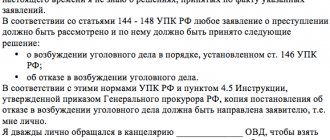Author of the article:
Muzyko Tatyana Andreevna - lawyer.
People in need of medical care can count on this.
There are various institutions in the country that can provide it quickly and efficiently. If the patient's rights are violated, inevitable punishment will follow from the authorities. Medical workers and entire institutions will bear responsibility.
Legislation
The state pays great attention to the health of citizens, recognizing the right of people to high-quality free services from medical organizations. Rules that allow you to solve problems related to the provision of medical care are contained in:
- “Law on the fundamentals of protecting the health of citizens” No. 323-FZ of November 21, 2011, which lists the cases and actions of paramedics and doctors when working with patients.
- “Law on Compulsory Insurance” No. 326-FZ dated November 29, 2010. It says here that the insured receive any necessary assistance on the territory of the Russian Federation.
- Criminal Code. Penalties are provided for refusal to work with a person or a careless attitude to the complaints of the person who applied.
- Government Decree No. 1492 dated December 8, 2017, guaranteeing free services of health workers to the population.
- Orders of the Ministry of Health dated December 20, 2000 No. 445/77, dated June 20, 2013 No. 388n, establishing the operating procedures of healthcare institutions and ambulances.
For the convenience of citizens, a unified emergency call service has been created - 112.
Dear readers! To solve your problem right now, get a free consultation
— contact the lawyer on duty in the online chat on the right or call: +7 (499) 938 6124 — Moscow and region.
+7 (812) 425 6761 — St. Petersburg and region. 8 (800) 350 8362 - Other regions of the Russian Federation You will not need to waste your time and nerves
- an experienced lawyer will solve all your problems!
In what cases can they refuse?
The legislator did not provide for the absolute possibility of refusing a patient. Feeling unwell, a person independently decides where to go - to the clinic or call an ambulance. The doctor assesses the patient's condition and determines treatment methods. The patient is placed in a hospital or is at home completing appointments.
Important : the only legitimate reason for refusing hospitalization is the absence of a threat to life.
A paramedic who arrives on call is required to examine the sick person and listen to complaints. If there is no threat to life, the person is redirected to the clinic, otherwise to the hospital.
Refusals due to lack of coupons or specialists are prohibited. The condition of the applicant is important: if there is a danger to life, services are provided within 2 hours, otherwise a wait of up to 10 days is possible. The appointment must be conducted by the head of the department or another doctor.
Is it legal for a doctor to refuse admission to a hospital?
A client gets to a medical facility in two ways: delivered by ambulance or referred by the attending physician. The first situation indicates an emergency need, the second - a planned examination. The institution’s specialists are required to examine the patient, fill out a card, describe the signs of the disease and their own observations. The doctor decides after the examination whether to place the applicant in the ward or not. The main thing will be the availability of evidence.
The doctor has no right to refuse due to lack of available places. It is illegal. The Ministry of Health has determined that under such circumstances it is possible to leave the client in the corridor of the clinic, but not longer than 24 hours, followed by placement in the ward.
Important : if there are no free beds in the hospital, doctors must place the patient in additional beds in the wards or corridor.
The requirement of the duty officer to show the insurance policy and other documents during emergency hospitalization is illegal. The latter can be delivered by relatives later, the main thing is that treatment begins on time. If the patient is referred by a doctor, the documents must be with him. The difference lies in the urgency of providing services. Planned treatment does not require haste, and delays in emergency cases will lead to dangerous consequences and even death.
Do we have the right to request a refusal in writing?
When working with a patient, the doctor is obliged to conduct an examination, do research using technology, and prescribe tests. The listed actions and their results are recorded in the card. Manipulations require written consent from the client, which is attached to medical documents.
If the doctor finds no signs of a threat to the patient's life, he can send the patient home. The reasons for refusal of hospitalization are described in the specialist’s report. A person has the right to receive a copy of such a document certified by the chief physician of a medical institution.
If clinic staff refuse to work with a patient upon contact, written evidence explaining their actions should be requested.
What consequences can there be for the doctor and the hospital?
It is important to know who exactly refused admission. If a doctor does this, he will face disciplinary action or criminal punishment, depending on the consequences. For example: the doctor refused to see the patient, and the latter died. The specialist will be punished for negligence, including imprisonment.
When reception staff refuse, the medical institution will bear responsibility and fines will be imposed on it. An emergency dispatcher cannot refuse to dispatch an ambulance. Such a fact will entail criminal liability.
Mediation
In each region of the Russian Federation there is a division of the Medical Chamber of the Russian Federation, which, on the one hand, protects the rights of medical workers, on the other, is called upon to be a guarantor of fairness in resolving a patient/doctor dispute. For this purpose, the mediation procedure has been introduced into the activities of the chamber - pre-trial resolution of disputes through negotiations between the parties with the participation of an intermediary - a mediator.
To protect violated rights through the mediation procedure, you can contact the Mediation Center (pre-trial dispute resolution) “Medical Chamber” of the region, or send your application by email (contacts can be found on the website of the “Medical Chamber” of the subject). The National Medical Chamber of the Russian Federation maintains a register of mediators and issues them permission to carry out activities in the field of medicine; Regional centers are gradually being created in each region of the Russian Federation, which operate free of charge. Contacts of the national medical chamber for more information: +7 495 959 2896, email You can also obtain data from regional medical chambers.
The procedure looks like this:
- a meeting is scheduled at which the citizen and medical worker state their demands;
- a specially trained mediator, who is not an interested party, conducts negotiations;
- if the parties have reached a common decision, this is documented;
- if consensus is not found, the patient has the right to use other methods of protection.
Contacting the Medical Chamber is free and does not oblige the patient to any subsequent actions if the dispute resolution option proposed by the mediator and the doctor does not suit him.
Where to go if a patient is denied hospital admission
When problems arise with admission to a hospital, it is necessary to listen to the explanations, try to refute them, citing the patient’s rights and warning about criminal liability if the condition worsens.
You should ask a senior employee for help. During the day this is the manager, the chief physician, at night he is the doctor on duty. If they do not help, you should call the emergency number - 112, 03. When calling, you should:
- explain the nuances in as much detail as possible;
- provide your personal details;
- describe the illness;
- indicate the name of the department or institution that refuses to hospitalize.
They will transport the patient to another hospital.
You can contact the compulsory insurance fund. The policy contains the information necessary for citizens' requests.
You can call the 24-hour phone number of Roszdravnadzor - 88005001835.
Denied hospital admission in another region
The rule is the same for everyone: a valid medical policy allows you to be treated for free throughout the country.
If a person's life is in danger, medical professionals must eliminate it free of charge, even without insurance. In the latter case, resuscitation measures are carried out until the patient’s condition improves, then he is discharged from the hospital with recommendations for further treatment at the place of residence.
If a specialist refuses to work with a client from another region, you should call an ambulance and call supervisory authorities.
Important: emergency assistance is provided free of charge, without insurance or documents, in any part of the country.
Can an ambulance refuse hospitalization?
If, upon arrival to the patient, the ambulance team detects an acute pain attack, but there are no other symptoms confirming that the person is in a serious condition, a decision may be made to relieve the pain with an injection.
Then there is no reason to hospitalize the patient by ambulance. If a person soon becomes ill again and calls an ambulance, this is already grounds for hospitalization.
In a situation where the ambulance staff considered that there was no reason for hospitalization and left, and the patient at that time feels that he is in a serious condition, he must:
- Make a second call to number “03” and inform the dispatcher that you are in serious condition. It is also necessary to state that the patient does not agree with the diagnosis and insists on hospitalization;
- Call the hotline of the Ministry of Health of the region where the patient lives if the ambulance dispatcher does not accept the second call.
You can find the phone number of a health authority by using the official website of this organization.
Important! The ambulance team does not have the right to refuse to provide medical care if the patient does not have documents with him. This also applies to those cases when a person does not have documents such as a health insurance policy and a passport.
According to legislative norms, if a person who does not have documents is taken to a medical institution by an ambulance, then he has the right to stay there until the threat to his life and health is eliminated. In each situation, the period is determined individually. The specified time spent in a medical institution is free for the patient.
If a controversial situation arises when doctors refuse to carry out treatment due to lack of documents, you must contact the health authority hotline.
We are writing a complaint
Any refusals of assistance, examination, examination require an appeal. What and where to write depends on the wishes of the patient.
Complaint against a doctor
It is written in the case when the doctor violated the rights of the patient: he refused hospitalization, examination, and so on. The complaint must be submitted in writing, in two copies. First, the details of the manager of the offending employee are indicated, then information about the applicant: last name, first name, patronymic, address, telephone.
The text should not contain gross offensive statements; the essence of the problem should be described in detail, starting from the date of the violation. At the end the applicant’s signature is placed.
A complaint is submitted to the chief physician through the secretary. The latter must put a mark on acceptance of the document on the second copy. You need to keep it.
Complaint about the hospital
To be completed in writing. The appeal can be sent by mail or delivered in person to the supervisory authority. The principle of registration is the same: the addressee, the applicant are indicated, the essence of the problem is stated in as much detail as possible. The document must be signed.
You can complain to Roszdravnadzor, health insurance funds, the Ministry of Health, the prosecutor's office, and the police.
Complaint to the Ministry of Health
Violations of the patient's rights, which led to consequences associated with material costs for further treatment, rehabilitation, etc., require the preparation of an appropriate petition. The claim is similar to the complaint, the general style of execution is no different.
The agency that should consider the appeal, the applicant’s personal data, and the essence of the problem are indicated, but at the end a requirement is added to compensate for damage or punish the perpetrators or explain the reasons for the violations.
Complaint to the prosecutor's office
You should contact the prosecutor's office when the client has suffered harm as a result of the actions of hospital staff:
- health condition has deteriorated;
- limbs had to be amputated;
- urgent surgery was required, and so on.
Supervision over the work of health care institutions is entrusted to this department. The document is sent to the prosecutor at the location of the hospital. The latter will order an inspection and, if the employees are found guilty, will forward the information to the police to initiate a criminal case. As a result, those involved will suffer the punishment they deserve.
This also includes facts when health workers ask to be paid for their services.
Statement of claim to court
When harm has been caused that requires compensation, it is necessary to seek justice. You should write a statement of claim. It indicates the name of the court, information about the plaintiff (applicant), defendant (medical institution). Next, the violations are described, and at the end they state a request to recover money from the culprit.
It is important to collect certificates and expert opinions confirming harm to health.
The original application and copies according to the number of persons involved are submitted to the court. For example, when the doctor was supported by the administration, there will be two defendants, and additional copies are needed for them.
The legislator does not limit a person’s number of requests. You can complain to several authorities at the same time, the main thing is that the person correctly formulates the requirements.
General legislative aspects
To figure out where to complain if you are denied hospitalization, you need to study the laws.
In a rule-of-law state, everything is based on the implementation of its norms. Thus, the right to receive medical care is contained in Article 19 of the Law of November 21, 2011 N 323-FZ. In particular, its text states that citizens of the country can count on receiving necessary services free of charge as part of compulsory health insurance. In addition, people are guaranteed the following privileges:
- choose a clinic and doctor;
- receive quality treatment, including: diagnostic;
- preventive;
- rehabilitation;
- stationary;
- outpatient.








